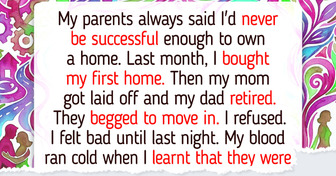If you babysit for their kids for free, you are saving them a ton of money and worry. If you are cooking for them when they get off work that is your groceries and time. You raised your kids. You should be out doing other things, enjoying your own trips, not making their life easier. The more you do for them, the less they will be ready if something should happen to you. People work all day, go home and cook and clean all the time. That comment tells us he doesn't appreciate what you do for them. Your daughter should have said something to him. I have to wonder if you are watching the kids while on vacation with them.
My Son-in-Law Wanted Me to Be His Personal Chef on Holiday—Instead, He Got a Wake-Up Call

Family vacations are meant to be a time of rest, joy, and togetherness. Yet when boundaries are left unspoken, what seems like a kind invitation can come with hidden expectations. Grandparents who start by helping a little often find themselves carrying the weight of full-time care without thanks. One grandmother discovered this during a trip she thought would finally give her the break she deserved.
Here is Sylvia’s story:
Hi Bright Side,
I spend most of my days caring for my grandkids while my son and his wife are at work. It isn’t always easy, but I do it out of love. When they invited me to join them on a family trip, I thought it was finally my chance to rest a little, to be cared for instead of always being the one doing the caring. I was genuinely excited.
But the moment we arrived, my son-in-law turned to me and said, “So, what’s for dinner? You’re not expecting a free ride, are you?” I wasn’t sure if I should laugh it off or cry.
The next morning, I made my point without raising my voice. I organized the refrigerator, labeled the food, wrote out a full meal plan, and pinned a chore schedule on the fridge that included everyone’s names, including mine. Nobody said a word, but the look on my SIL’s face told me everything.
Now the air feels heavy between us. I still want to be close to my grandchildren. I still want to feel like part of the family. But I don’t want to be treated as though my only worth is the work I provide. I’m torn between speaking up and staying silent. Maybe I’m overreacting. Maybe I’m not. I honestly don’t know what to do next.
Sincerely,
Sylvia
Sylvia, thank you for opening up about your experience. The way you handled the situation showed both grace and strength. What often begins as a simple offer of support can quietly grow into a role that feels less like kindness and more like obligation.
When care and effort are no longer acknowledged, the love behind them can feel overlooked, leaving the giver drained. Wanting respect and boundaries doesn’t make you unreasonable. It means you value yourself as much as the people you care for.
Explain where genuine help ends and obligation begins.

Why cant you just say im not doing it. This push to be gentle etc.. for what? They are children. What made you think that family vacations are relaxing? Lol. You need a vacation- from them not with them imo
True support is something you choose to give, but when it’s expected without thanks, it becomes unfair. Let your family know clearly what you’re comfortable taking on and what feels like too much. A gentle way to put it might be, “I’m glad to spend this time together, but I also need space to relax.” It might feel uneasy to say out loud, yet it’s an important step in protecting your own limits.
Use wit as a gentle way to reset the balance.
Your approach with the organized fridge and chore list was smart. It spoke volumes without raising your voice. Playful tactics like that can ease the pressure while still showing where you stand. You might keep that spirit going by adding a touch of humor in future moments: “Since I’m on kitchen duty, should I be clocking my hours?”
Pull your daughter aside and explain how you’re feeling.
At times, our kids don’t see the full picture of how things affect us. Find a calm moment to speak with your daughter alone and share honestly how you’ve been feeling. Explain that you’d appreciate his help in making sure your role in the family feels balanced and appreciated, especially in your relationship with her husband.
Give your time where it adds value, not where it’s simply expected.

They are lucky that you divided up the chores and didn't just book a flight back home.
Showing up for family doesn’t have to mean giving every ounce of your time. Pick the spaces that bring you happiness. Maybe it’s story time with the kids, sitting down at the table together, or simply enjoying lighthearted conversations. Your place is with them, not as their constant caretaker. Protect your energy so that your presence stays joyful instead of exhausting.
Family dynamics can be complicated, especially when expectations aren’t clear. Finding the right balance of respect, love, and boundaries takes patience—but it’s worth it to preserve meaningful relationships. For another story about navigating tricky family expectations, you might find this article interesting.
Comments
I think what you did is fair everyone pitches in not just you doing everything. If I was you after the holiday pull back do less let them realize how much they messed up and treated you badly
She probably would have had a better holiday at home while they went on vacation. At least a little time for herself. I would also make a point to show them how expensive childcare is and charge them. Tell the son in law, "you weren't expecting a free ride were you???" What a punk.
Confused; it went from son&wife, to son in law. Either way, horrible.
This is what happens when you roll over and play doormat to a bunch of pathetic user losers!!! Wake up people they dont respect you they never will and first chance they will take their kids away from you. But then again the little brats will probably turn out just like them anyway so no loss!
She should've set the boundaries from the start before it got to this point. But I’m glad she’s realizing it now and trying to fix the mess. If they need babysitters, they can hire one themselves instead of relying on grandma. If they have money to have kids, they have money to pay for babysitters. Period.
Related Reads
I Gave My Daughter the World, Now She Wants My Retirement Fund Too

I Refuse to Cancel My Retirement Trip to Be on Babysitting Duty

13 Work Stories That Prove Real Life Writes Better Comedy Than Any Script

I Refused to Talk to My Parents After They Chose My Ex-Wife Over Me

I Refused to Pay for Our Valentine’s Dinner—Then I Learned the Heartbreaking Truth

16 Tiny Acts From Strangers That Left Permanent Marks on People

10 Moments That Show Kindness Doing the Heavy Lifting

10 Jaw-Dropping Moments When People Stumbled Upon Secrets They Weren’t Meant to See

10 Dating Stories That Started Like Rom-Coms but Ended Like Horror Movies

I Gave Up My 2-Month-Old Baby for Adoption Because I Chose My Own Happiness

My Parents Told Me I’d Never Own a Home, Now They Want to Move In

14 Stories From Cleaners That Are Wilder Than Any Movie Script


